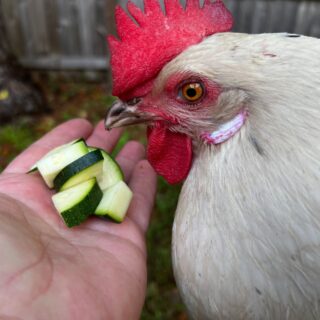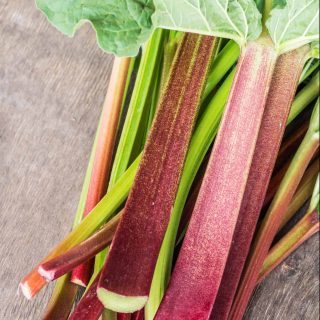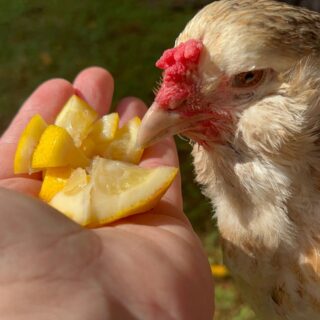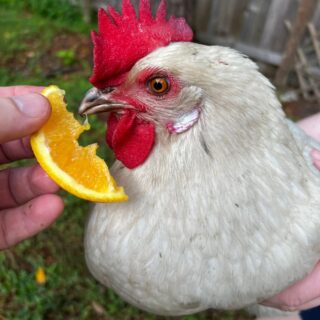At MrAnimal Farm, we can't get enough sweet potatoes. They are all the starchy, carby goodness of regular potatoes, baked or mashed, but with many more nutrients and much, much healthier. So, will those nutrients cross over to your livestock? Can chickens eat sweet potatoes or will they end up colder than a spud in the fridge?
Keep scrolling to find out if chickens can eat sweet potatoes and what happens if they do!
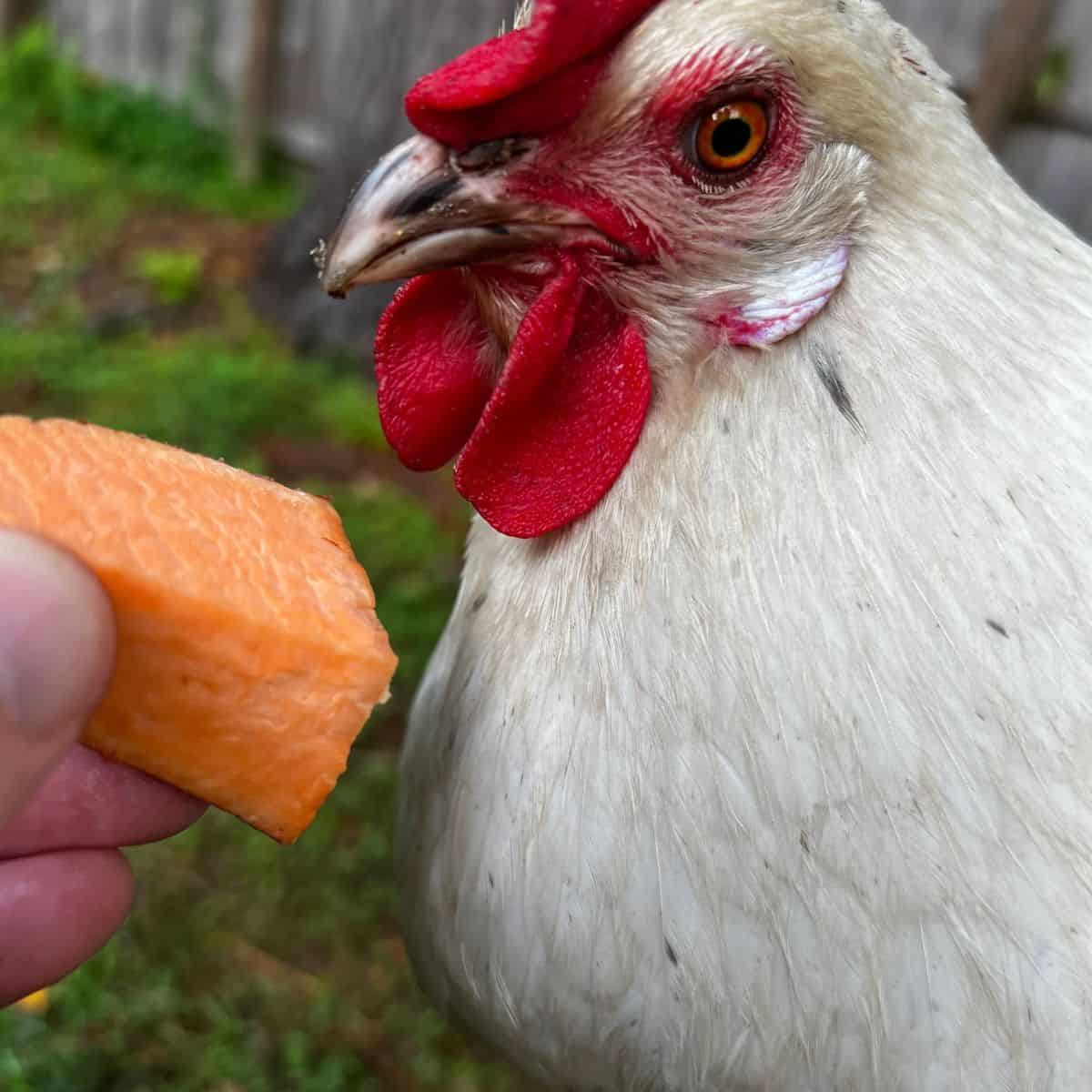
Jump to:
Can Chickens Eat Sweet Potatoes?
Yes, chickens can eat sweet potatoes. And, boy, do they love them! In fact, making sweet potatoes a regular part of your chickens weekly diet will help them stay happy and healthy.
Are sweet potatoes safe for my chickens to eat?
Sweet potatoes are 100% safe for your chickens to eat. In fact, at one point in time, sweet potatoes were used in chicken feed and as a supplement.
Feeding highly nutritious treats to your chickens can help them maintain their health and will make their regular health checks go much smoother.
Can chickens eat sweet potato skin?
Yes, chickens can eat sweet potato skin, unlike white potato skins which contain solanine and are toxic. You might be surprised to find out that sweet potatoes are not in the same family as white potatoes and, therefore, do not contain the toxic solanine.
Need some help keeping your chickens health and care taken care of? Check out the Organized Chicken Keeper for an easy to follow system.
Can chickens eat sweet potato flowers, leaves, or roots?
Yes they can eat sweet potato leaves, flowers, roots, as well as stems, and vines, too! The entire sweet potato plant is perfectly safe, nutritious, and delicious for your chickens to eat/
Can chickens eat white potatoes? What about other color potatoes?
You will want to avoid raw potatoes, potatoes with green skin, any part of the potato plant, including the seed pods and even the flowers. Like when chickens eat tomatoes, they are part of the nightshade family and contain solanine, which can be harmful for your chickens.
They also contain some other substances that can affect their heart function, how well they can absorb nutrients, digest their food, and even cause chronic discomfort like itchiness and pain.
Essentially, sweet potatoes are okay but any other kind, whether white, yellow, blue, or red, should be avoided. Technically, the real danger lies with potatoes that have green skin but the others can be harmful, in large quantities.
Are sweet potatoes healthy for chickens?
As we mentioned earlier, sweet potatoes, skin, leaves, roots, and all are a great and healthy snack for your chicken flock. Sweet potatoes are chock full of vitamins, minerals, and other nutrients essential to good health.
What are the nutritional benefits of sweet potatoes for chickens?
Below, You'll find the USDA FoodData Center nutritional analysis on a serving size of 1 small (60 g), baked sweet potato with skin.
| Name | Amount | Measurement |
|---|---|---|
| Water | 45.500 | g |
| Energy | 54.000 | kcal |
| Protein | 1.210 | g |
| Fat | 0.090 | g |
| Ash | 0.810 | g |
| Fiber, total dietary | 1.980 | g |
| Sugars, total including NLEA | 3.890 | g |
| Calcium, Ca | 22.800 | mg |
| Iron, Fe | 0.414 | mg |
| Magnesium, Mg | 16.200 | mg |
| Phosphorus, P | 32.400 | mg |
| Potassium, K | 285.000 | mg |
| Sodium, Na | 21.600 | mg |
| Zinc, Zn | 0.192 | mg |
| Copper, Cu | 0.097 | mg |
| Manganese, Mn | 0.298 | mg |
| Selenium, Se | 0.1 | µg |
| Vitamin C, total ascorbic acid | 11.8 | mg |
| Vitamin B-6 | 0.2 | mg |
| Folate, total | 3.6 | µg |
| Carotene, beta | 6,900.0 | µg |
| Carotene, alpha | 25.8 | µg |
| Vitamin A, IU | 11,500.0 | IU |
| Vitamin E (alpha-tocopherol) | 0.4 | mg |
| Vitamin D (D2 + D3) | 0.0 | µg |
| Vitamin K (phylloquinone) | 1.4 | µg |
What do these nutrients do?
If you are interested to know what all of those nutrients listed actually do for your chickens, this list will help give you some more understanding.
- Vitamin A: eye, skin, respiratory, and digestive health
- Carbohydrates: give chickens energy
- Copper: helps digestion and elevates the immune system
- Vitamin C: joint, cellular, and immune health; collagen synthesis
- Vitamin D3: improves bone health along with calcium
- Fiber: only small amounts or they can become constipated, get a blockage, etc; energy, growth, and digestive health
- Iron: prevents anemia
- Vitamin K: blood clotting, bone metabolism
- Magnesium: bone strength and development, cellular metabolism, heart health, muscle function
- Potassium: temperature control; hydration & electrolyte regulation, metabolism; heart health/heart disease preventative
- Protein: muscle growth and development
- Starch: assists with digestion & energy
- Zinc: immune system and mineral retention
Should you feed them cooked or raw?
The truth is, chickens will eat them either way. Our personal recommendation is to cook them, ideally boiled, which we will get to in a moment, as cooked sweet potatoes are much softer and much, much easier for your chickens to eat.
How do you feed sweet potatoes to chickens?
Your choices really break down to raw or cooked and whole or cut/sliced/diced. Let's look at the options.
Whole or cut?
Regardless of if you cook your sweet potatoes first or leave them raw, we recommend cutting them up before giving them to your chickens. Cutting them into slices or dice will make it a lot easier for them to break up and eat. Plus, when cut into small pieces, you can scatter a single potato in a much larger area and avoid any chickens fighting over a single sweet potato.
Raw
Raw sweet potatoes are perfectly fine for chickens to eat. They are going to be tough for them to break up, though. You can help them out a little by cutting them up first, but even then, your chickens will have a difficult time eating and may even be at risk of choking.
Cooked
There are actually several different ways to make cooked sweet potatoes for your chickens; boiled, baked, roasted, or fried.
Boiled
Boiling sweet potatoes is our favorite method of preparation when feeding them to our chickens. The reason is because it's really easy to do. Just cut your sweet potato into cubes and put them in a pot of boiling water; 12-15 minutes for 1" cubes and 20-25 minutes for 2" cubes.
When they're finished, just toss the cubes to your chickens, spread out so they don't dog pile on each other, and watch them enjoy.
Additionally, you can also mash the sweet potatoes after boiling them and serve them that way. However, that can get unnecessarily messy AND adds in an extra step. We just wanted to give you the option but we don't think it's a very practical way to feed your chickens.
Baked
Baked sweet potato is probably the most common way they are prepared. They have all the same advantages of boiled except, it's a whole potato which does not spread as far, baking generally takes longer than boiling, and, can sometimes, caramelize in the oven.
If your sweet potatoes caramelize, make sure to remove those pieces before giving them to your chickens. The extra concentration of sugar can be too much of a sugar overload and make your chickens feel really bad.
Roasted
Roasted is like a combination of boiling and baking. Since you typically cut them into cubes before cooking them, they will be soft enough for your chickens to eat. They do, however, run the same risk of caramelization that baking does, so be on the lookout for that. And, roasting will likely take longer than boiling.
If you do decide to roast them, only roast the sweet potatoes. Skip grandma's secret recipe and don't use any seasonings.
Fried
We added this here to address things like sweet potato fries. While, they likely won't hurt them if they just have a single fry, we still do not recommend it. Fried sweet potatoes are going to have way too much fat and generally have a lot of salt on them too.
Frequently Asked Questions
Q1. How often can I feed sweet potato to my chickens?
We recommend between 3 to 5 times a week, if it's a regular treat. Generally, we stick to making 10% of a chicken's diet snacks and treats while the other 90% should be quality feed and bugs, insects, and stuff like that. However, sweet potatoes have been used as a supplemental feed in the past. You can likely get away with feeding sweet potatoes more often than, say, feeding chickens watermelon, feeding chickens cantaloupe, or feeding chickens radishes.
Q2. How many sweet potatoes can I feed to my chickens?
If you cut them into cubes, a single sweet potato can feed around 5 chickens, give or take a chicken. Obviously, this is just a guideline and you will know for sure once you feed them the first time.
If you need more help with taking care of your chickens, check out The Organized Chicken Keeper for a complete system for managing their health through keeping their supplies stocked and coop clean.

